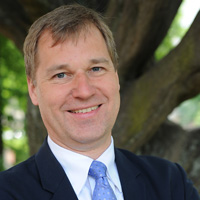Prof. Dr. Frieder R. Lang (2018-2021)
Prof. Dr. Frieder R. Lang
Institut für Psychogerontologie
Lehrstuhl für Psychogerontologie
- Telefon: +4909115302-96102
- E-Mail: frieder.lang@fau.de
Akademische Grade
2001
Habilitation und „venia legendi“ für Psychologie, Habilitationsschrift: „Die Regulation sozialer Beziehungen“ Humboldt-Universität zu Berlin
1993
Promotion (Dr. phil).
Freie Universität Berlin
1990
Diplom in Psychologie
Technische Universität Berlin
Beruflicher Werdegang
2008
Ruf auf W3-Professur für Pädagogische Psychologie / Angewandte Entwicklungspsychologie (abgelehnt)
Universität Trier
seit 2006
Inhaber des Lehrstuhls für Psychogerontologie und Leiter des Instituts für Psychogerontologie
Friedrich-Alexander-Universität Erlangen-Nürnberg
2002 – 2006
Universitätsprofessor für Entwicklungspsychologie
Martin-Luther-Universität Halle-Wittenberg
1999 – 2002
Wissenschaftlicher Assistent
Humboldt-Universität zu Berlin, Erziehungswissenschaftliche Fakultät
1994 – 1999
Wissenschaftlicher Mitarbeiter
Freie Universität Berlin, Universitätsklinikum Benjamin-Franklin, Forschungsgruppe Psychologische Gerontologie
1990 – 1994
Promotions- und Post-doc Stipendium
Max Planck-Institut für Bildungsforschung, Berlin
Editor-in-Chief
2010-2015
GeroPsych – The Journal of Gerontopsychology and Geriatric Psychiatry
Forschungsinteressen
- Gesundheit und Lebensqualität im Alter
- Persönlichkeit und Wohlbefinden im Lebenslauf
- Zeit- und Zukunftserleben
- Soziale Bedingungen des Alterns
- Familie und Generationenbeziehungen
- Gerontotechnologie und Technikpsychologie
Auswahl aktueller Forschungsprojekte und –verbünde
- Psychologie der Verwandtschaft und Kooperation (DFG-Projekt mit Prof. Dr. Franz Neyer, Universität Jena)
- Benefits of Negative Social Exchanges and Future Perspective Across the Life Span (Kooperation mit Prof. Dr. Helene Fung, The Chinese University of Hong Kong)
- Altern als Zukunftsunternehmung (ZAL): Bedingungen alternsbezogenen Risiko- und Grenzmanagements in der mittleren und nachberuflichen Lebensphase (gefördert durch die Volkswagen-Stiftung, Kooperation mit Gert G. Wagner, DIW Berlin)
- Fit4Age – Bayerischer Forschungsverbund. Zukunftsorientierte Produkte und Dienstleistungen für die demographischen Herausforderungen (gefördert durch die Bayerische Forschungsstiftung, Sprecher des Querschnittprojekts Fit4Use – Akzeptanz und Nutzung alternsgerechter Technologie)
Einige repräsentative Publikationen
* Um auf einzelne Artikel zugreifen zu können, ist die Eingabe eines gültigen Benutzernamens (= GERONTO) und eines Passworts erforderlich. Sollten Sie das Passwort nicht besitzen, so wird Ihnen PSYCHO helfen, wenn Sie eine E-Mail an PSYCHO@geronto.uni-erlangen.de senden.
Rohr, M. K., & Lang, F. R. (2009). Aging well together–A mini-review. Gerontology, 55, 333-343.
Weiss, D., & Lang, F. R. (2009). Thinking about my generation: Adaptive effects of a dual age identity in later adulthood. Psychlogy and Aging, 24, 729-734.
Wahl, H. W., Diehl, M., Kruse, A., Lang, F. R., & Martin, M. (2008). Psychologische Alternsforschung: Beiträge und Perspektiven. Psychologische Rundschau, 59, 2 – 23.
Lang, F. R., & Fingerman, K. L. (Eds.) (2004). Growing together: Personal relationships across the lifespan. New York, NY: Cambridge University Press.
Wahl, H.-W., & Lang, F. R. (2004). Aging in contexts across the adult life span: Integrating physical and social research perspectives. In H.-W. Wahl, R. Scheidt, & P. Windley (Eds.), Annual Review of Gerontology and Geriatrics (Vol. 23: Environments, Gerontology, and Old Age) (pp. 1–33). New York: Springer.
Neyer, F. J., & Lang, F. R. (2003). Blood is thicker than water: Kinship orientation across adulthood. Journal of Personality and Social Psychology, 84, 310-321.
Lang, F. R. (2001). Regulation of social relationships in later adulthood. Journal of Gerontology: Psychological Sciences, 56B, 321-326.
Lang, F. R., & Heckhausen, J. (2001). Perceived control over development and subjective well-being: Differential benefits acrossadulthood. Journal of Personality and Social Psychology, 81, 509-523.
Lang, F. R., & Baltes, M. M. (1997). Being with people and being alone in late life: Costs and benefits for everyday functioning. International Journal of Behavioral Development, 21, 729-746.
Lang, F. R., Featherman, D. L., & Nesselroade, J. R. (1997). Social self efficacy and short-term variability in social relationships: The MacArthur successful aging studies. Psychology and Aging, 12, 657–666.
Lang, F. R., & Carstensen, L. L. (1994). Close emotional relationships in late life: Further support for proactive aging in the social domain. Psychology and Aging, 9, 315-324.
